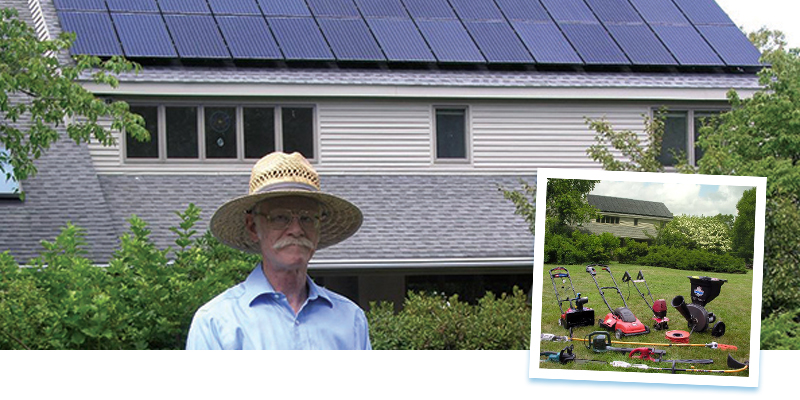Satisfied by Solarize

George & Margaret of Harvard: Solar Electric and Battery Backup Systems
Click here to read about George’s Battery Backup System.
“85% of our electricity comes from the sun, and we get bragging rights in any conversation about global warming.”
George and Margaret have always been environmentally conscious. They are diligent about recycling and water use, and switched to energy-efficient light bulbs and programmable thermostats years ago. But solar power, which was on their radar since the 1980s, was just a dream until the town of Harvard joined the Solarize Massachusetts pilot program in 2011. Finally, solar became affordable.
Their solar power system has lived up to its promise: 85% of their electricity now comes from the sun. “We get bragging rights in any conversation about global warming,” jokes George, a retired software engineer and avid gardener. His electric lawn and garden tools now run on solar-generated electricity instead of fossil-fueled utility power, making them truly emissions-free.
| System Stats | |
|---|---|
| System Wattage | 7,770 |
| Annual Production | 9,838 kWh |
| Solar Panels | 42 Schuco |
| Inverters (2) | Solectria, PVI-4000 |
| Go Live Date | March 2012 |
| Electric Bill Reduction | 85% |
| Electricity Savings Over 20 Years | $46,000+ |
| Break Even Period | ~ 6 Years |
The couple is thrilled with the system, which is “working exactly as advertised, and it looks great,” George says.
Now, George wants to convince others to go solar, even if more solar owners means fewer bragging rights. His advice to others, in his own words:
- Get as big a system as you can afford.
- Don’t go cheap. Our roofing contractor told us about a roof he replaced because the solar installer nailed the pedestals to the shingles, causing leaks and rot. Make sure you get a solid installation and reliable equipment. Even if you sell the house later, a working solar power system adds to the re-sale value.
- When estimating how fast your solar power system will pay for itself, don’t place too much emphasis on SRECs. Their value may go up or down, depending on politics.
- Expect production to vary during the year. In the spring, when sun angle and temperature are best, we produce more than we use. In the summer, the air conditioning uses more power than we produce.

